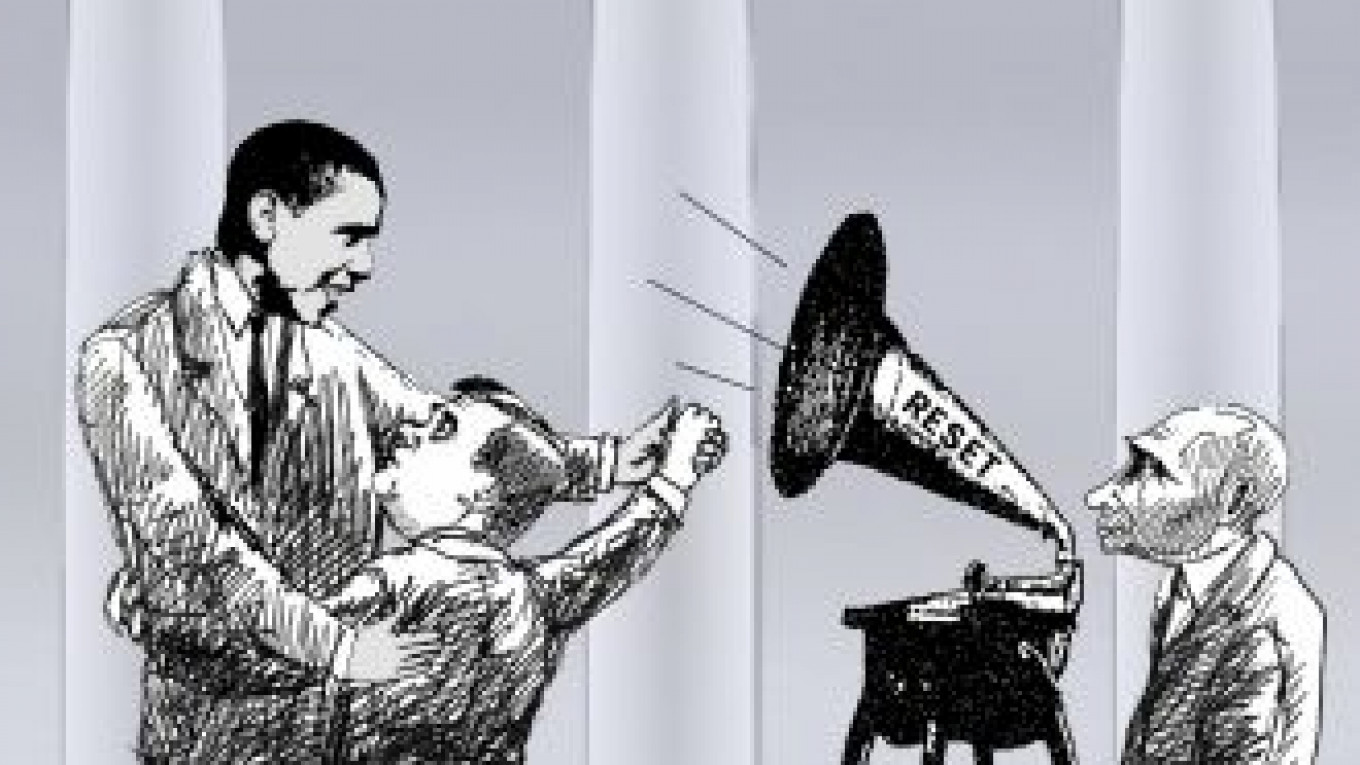The “reset” of U.S.-Russian ties started two years ago, on Feb. 7, 2009, when U.S. Vice President Joe Biden extended an olive branch to Moscow at a security conference in Munich.
“It is time to press the reset button and to revisit the many areas where we can and should be working together with Russia,” said Biden, who had taken office about two weeks earlier after the “Change We Can Believe In” campaign swept President Barack Obama into the White House.
This week, Biden is visiting Moscow to gauge whether the reset is one we can believe in.
By all appearances, the answer is a resounding yes. The reset has opened the door to a frank, ongoing dialogue — no small feat after relations sank to post-Cold War lows amid animosity and distrust between the hawkish administrations of George W. Bush and Vladimir Putin.
The winners that have emerged in the reset are the White House, the Kremlin and big business.
For President Dmitry Medvedev, the reset brought the welcome news from Obama in September 2009 that he would ditch Bush’s plan to deploy a missile defense system in Europe. In its place, Obama is pressing ahead with a less controversial proposal for a revamped system with limited Russian participation.
Medvedev returned the favor to Obama last June by agreeing to support new U.S.-backed UN Security Council sanctions against Iran.
In another perk for Washington, Moscow has allowed U.S.-led NATO forces to transit Afghanistan-bound military supplies over Russian territory.
Reinvigorated dialogue between the White House and the Kremlin paved the way for the much-
heralded New START nuclear arms reduction treaty, which entered force when U.S. and Russian officials exchanged documents last month at the same Munich security conference where Biden announced the reset in 2009.
Improved relations also prevented fiascos like last year’s U.S. sleeper spy arrests and the extradition of suspected arms dealer Viktor Bout to New York from exploding into full-blown, Cold War-style dramas.
In addition, calmer rhetoric from Moscow and Washington has played a role in improving the Russian business climate in the eyes of foreign investors, perhaps even encouraging U.S. company PepsiCo to acquire Wimm-Bill-Dann last fall for $3.8 billion.
But there are “reset” losers, too: the Russian opposition, Russian democracy, Ukraine and Georgia.
Together with the promised reset, Obama offered the Kremlin a welcome gift during a visit to Moscow in July 2009 by promising not to “lecture” the country about democracy. True to his word, the White House has been noticeably silent on the issue, with perhaps the exception of Obama’s Russia adviser, Michael McFaul, nudging Moscow on its democratic record during a conference in Yaroslavl last September and the U.S. State Department expressing concern about police crackdowns on anti-Kremlin demonstrators last summer.
Gone are the days when the White House publicly prodded the Kremlin on the politically tinged case of jailed former Yukos CEO Mikhail Khodorkovsky. The 2009 prison death of Hermitage lawyer Sergei Magnitsky inspired barely a nod, even as it infuriated lawmakers in Washington and elsewhere.
An even bigger gift to the Kremlin has been Obama’s de facto rejection of Bush’s policy of “spreading democracy” in Russia’s backyard, notably in Georgia and Ukraine. Georgian President Mikheil Saakashvili is making a visit to the United States this week, perhaps to calm his jitters as Biden visits Moscow. But the trip does little to mask the fact that his government misses the staunch, public support that it received from the Bush administration. It’s no surprise that Tbilisi has no plans to name a street after Obama, an honor already afforded to Bush.
Ukraine, meanwhile, has slid back toward Moscow’s orbit, with its pro-Western government replaced by a Moscow-friendly one in February 2010.
Biden has reason to celebrate during his visit to Moscow despite the concessions on democracy — issues largely beyond Washington’s control anyway. Two years on, U.S.-Russian ties have never been more vibrant than they are today. This is a milestone that offers us hope.
But there is one important caveat to the reset: Everything rests on Medvedev. If Obama and Biden want to keep the reset, they must find a way to back Medvedev for a second term in the 2012 presidential election. If Putin or a third candidate takes office, the reset will be over.
A Message from The Moscow Times:
Dear readers,
We are facing unprecedented challenges. Russia's Prosecutor General's Office has designated The Moscow Times as an "undesirable" organization, criminalizing our work and putting our staff at risk of prosecution. This follows our earlier unjust labeling as a "foreign agent."
These actions are direct attempts to silence independent journalism in Russia. The authorities claim our work "discredits the decisions of the Russian leadership." We see things differently: we strive to provide accurate, unbiased reporting on Russia.
We, the journalists of The Moscow Times, refuse to be silenced. But to continue our work, we need your help.
Your support, no matter how small, makes a world of difference. If you can, please support us monthly starting from just $2. It's quick to set up, and every contribution makes a significant impact.
By supporting The Moscow Times, you're defending open, independent journalism in the face of repression. Thank you for standing with us.
Remind me later.






